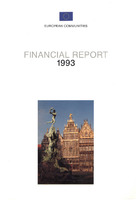| dc.contributor.author | Commision of the European Communities |
| dc.date.accessioned | 2020-06-21T13:38:09Z |
| dc.date.available | 2020-06-21T13:38:09Z |
| dc.date.issued | 1993 |
| dc.identifier.uri | https://ketlib.lib.unipi.gr/xmlui/handle/ket/2459 |
| dc.description | Sections are bookmarked. |
| dc.description | http://aei.pitt.edu/id/eprint/35728 |
| dc.description.abstract | The basic budget principles Six basic principles govern the budget of the European Communities: Unity This principle. which is enshrined in Article 199 of the Treaty. means that all Community expenditure and revenue must be incor-porated in a single budget document. In the early years of the Community, the autonomy of the institutions set up under the ECSC, EEC and Euratom Treaties resulted in up to five separate budgets being produced to cover any one year. Since the Treaty of Luxem-bourg of 22 April 1970, the Community's essential financial activities have tended to move towards a unified budget, and there are now only two budget documents, the general budget and the ECSC operating budget |
| dc.format.extent | 86p. |
| dc.language.iso | en |
| dc.publisher | Office for Official Publications of the European Communities |
| dc.subject | Economic and Financial Affairs |
| dc.subject | Budgets and Financing |
| dc.title | European Communities financial report 1993 |
| dc.type | working document |
| dc.publisher.place | Luxembourg |

